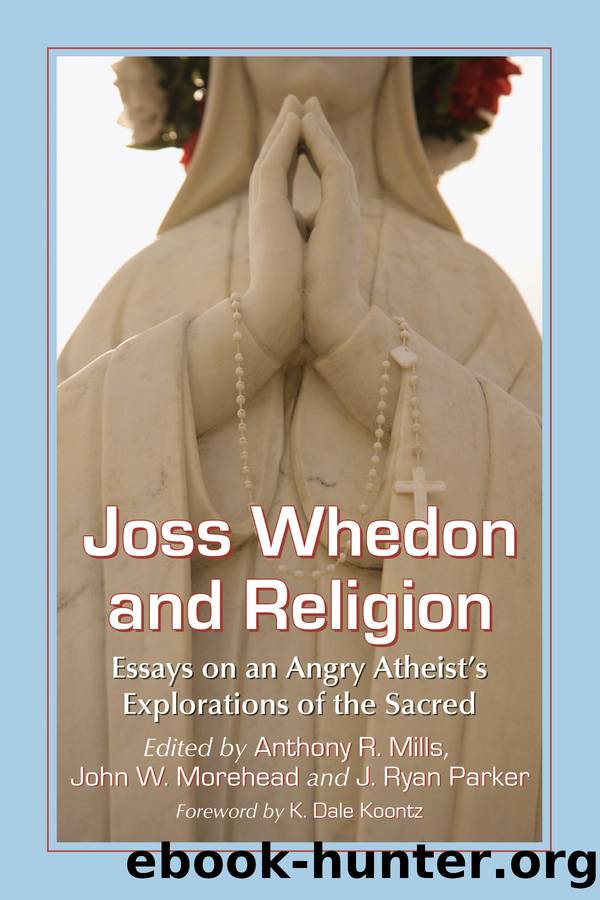Joss Whedon and Religion by Anthony R. Mills

Author:Anthony R. Mills
Language: eng
Format: epub
Publisher: McFarland
Published: 2013-09-29T16:00:00+00:00
â...intently at your own belly buttonsâ
Apart from his personal atheism, Whedonâs corpus suggests an interesting reason for his rejecting the theistically driven ethical perspectives of Pojman and Craig. Consider the Watchers Council in England, the Wolfram & Hart senior partners, the Parliament of the Alliance, and the Rossum Corporation main office executives. Each of these organizations has a sort of phantom, faceless existence, and, although each is well publicized, their actual existence is occasionally questioned. If they do exist, each works behind the scenes very subtly and from a distance. Each serves the primary purpose of constraining behavior or providing obstacles to Whedonâs characters. Because they inhibit autonomous and authentic existence, each is portrayed in a negative dramatic light. Buffy, Angel, Mal, and Caroline/Echo (Eliza Dushku) are portrayed as heroes exactly because each struggles against the influences of these organizations in the hope of leading a more autonomous and authentic life. But the full value of such a life cannot be realized unless it is guided by ethical ideals, including doing the right thing because it is right.28
Now recall how God is often interpreted or utilized by theistically driven ethicists. Among Godâs primary purposes is to ensure that we uphold our ethical obligations via the threat of everlasting punishment. But the world is religiously ambiguous; Godâs existence, despite the fact that it is well-publicized, is not abundantly clear. So, if God does exist, he works subtly, behind the scenes, and from a distance. Therefore, Godâs role in theistic ethics is eerily similar to the workings of Whedonâs phantom, faceless organizations. Because he portrays those organizations antagonisticallyâat odds with his protagonistsâit is likely that he would also view theistic ethical systems antagonistically. From his perspective, it is better that we do the right thing simply because it is right, leaning on each otherâand especially close friendsâfor support in our quest to become champions. God is arguably inimical to this. In this way, God isnât all that welcome on Whedonâs boat, even if there is always room for one more dependable friend, shepherds included.
And what does the Whedonverse teach us about ethics? From Mal and the Firefly âverse, Whedon expresses the importance of respecting persons, of community and friendship, and the character traits that facilitate respect, friendship, and community. However, Mal sometimes reverts to mere pragmatics; losing his moral rudder, he loses sight of doing the right thing. This explains his character arc in Serenity. From the Angel universe, Whedon expresses the importance of having a distinctive sort of moral character that facilitates the resolve to do good things simply because they are good, including noble acts of self-sacrifice. However, Angel occasionally overlooks the importance of friendship and community, with the Darla story arc of season two serving as a vivid example.29 Viewers are led to believe that Mal and Angel could learn and benefit from each other and their respective perspectives. Putting together the strengths of each perspective overcomes their respective weaknesses. Putting them together also results in a potentially appealing perspective on ethics, one that does not directly rely on the truth of theism.
Download
This site does not store any files on its server. We only index and link to content provided by other sites. Please contact the content providers to delete copyright contents if any and email us, we'll remove relevant links or contents immediately.
Still Foolin’ ’Em by Billy Crystal(36319)
Spell It Out by David Crystal(36090)
The Great Music City by Andrea Baker(31768)
Professional Troublemaker by Luvvie Ajayi Jones(29631)
Trainspotting by Irvine Welsh(21588)
Call Me by Your Name by André Aciman(20453)
We're Going to Need More Wine by Gabrielle Union(19010)
The Secret History by Donna Tartt(18977)
Cat's cradle by Kurt Vonnegut(15277)
Ready Player One by Cline Ernest(14595)
Molly's Game by Molly Bloom(14115)
Bombshells: Glamour Girls of a Lifetime by Sullivan Steve(14027)
The Goal (Off-Campus #4) by Elle Kennedy(13625)
Leonardo da Vinci by Walter Isaacson(13260)
4 3 2 1: A Novel by Paul Auster(12344)
The Social Justice Warrior Handbook by Lisa De Pasquale(12172)
The Break by Marian Keyes(9343)
Crazy Rich Asians by Kevin Kwan(9241)
The remains of the day by Kazuo Ishiguro(8910)
